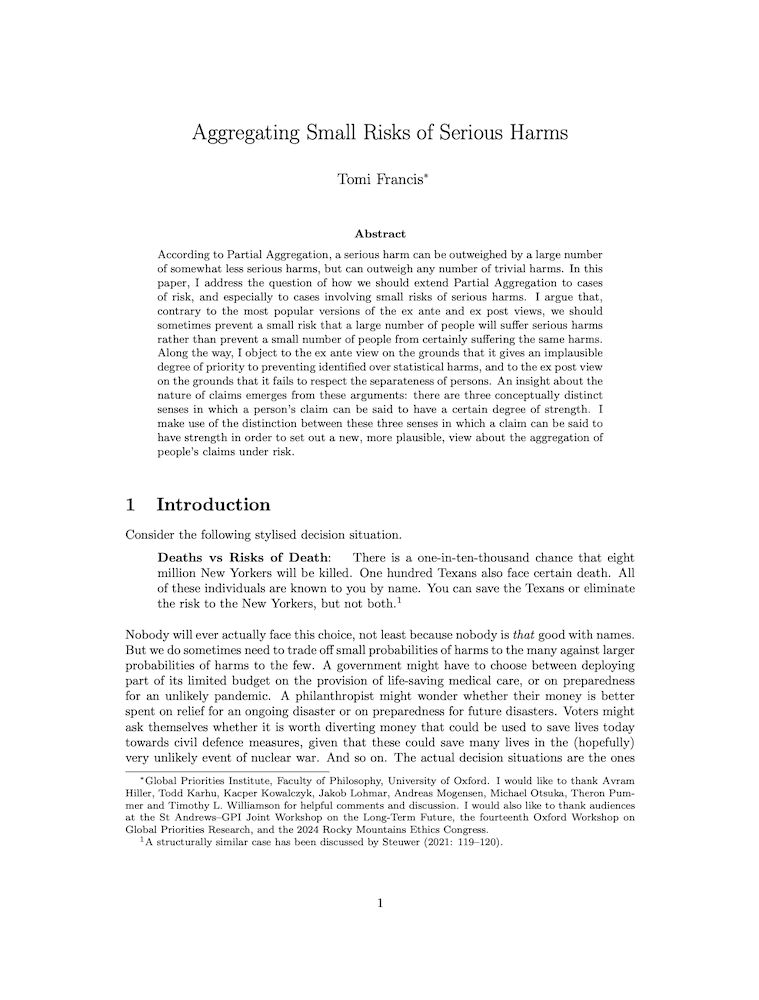Aggregating Small Risks of Serious Harms
Tomi Francis (Global Priorities Institute, University of Oxford)
GPI Working Paper No. 21-2024
According to Partial Aggregation, a serious harm can be outweighed by a large number of somewhat less serious harms, but can outweigh any number of trivial harms. In this paper, I address the question of how we should extend Partial Aggregation to cases of risk, and especially to cases involving small risks of serious harms. I argue that, contrary to the most popular versions of the ex ante and ex post views, we should sometimes prevent a small risk that a large number of people will suffer serious harms rather than prevent a small number of people from certainly suffering the same harms. Along the way, I object to the ex ante view on the grounds that it gives an implausible degree of priority to preventing identified over statistical harms, and to the ex post view on the grounds that it fails to respect the separateness of persons. An insight about the nature of claims emerges from these arguments: there are three conceptually distinct senses in which a person’s claim can be said to have a certain degree of strength. I make use of the distinction between these three senses in which a claim can be said to have strength in order to set out a new, more plausible, view about the aggregation of people’s claims under risk.
Other working papers
Is Existential Risk Mitigation Uniquely Cost-Effective? Not in Standard Population Models – Gustav Alexandrie (Global Priorities Institute, University of Oxford) and Maya Eden (Brandeis University)
What socially beneficial causes should philanthropists prioritize if they give equal ethical weight to the welfare of current and future generations? Many have argued that, because human extinction would result in a permanent loss of all future generations, extinction risk mitigation should be the top priority given this impartial stance. Using standard models of population dynamics, we challenge this conclusion. We first introduce a theoretical framework for quantifying undiscounted cost-effectiveness over…
How important is the end of humanity? Lay people prioritize extinction prevention but not above all other societal issues. – Matthew Coleman (Northeastern University), Lucius Caviola (Global Priorities Institute, University of Oxford) et al.
Human extinction would mean the deaths of eight billion people and the end of humanity’s achievements, culture, and future potential. On several ethical views, extinction would be a terrible outcome. How do people think about human extinction? And how much do they prioritize preventing extinction over other societal issues? Across six empirical studies (N = 2,541; U.S. and China) we find that people consider extinction prevention a global priority and deserving of greatly increased societal resources. …
Welfare and felt duration – Andreas Mogensen (Global Priorities Institute, University of Oxford)
How should we understand the duration of a pleasant or unpleasant sensation, insofar as its duration modulates how good or bad the experience is overall? Given that we seem able to distinguish between subjective and objective duration and that how well or badly someone’s life goes is naturally thought of as something to be assessed from her own perspective, it seems intuitive that it is subjective duration that modulates how good or bad an experience is from the perspective of an individual’s welfare. …

